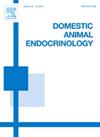家畜颗粒细胞功能:FSH、胰岛素和胰岛素样生长因子1体外影响的研究进展
IF 2.1
2区 农林科学
Q2 AGRICULTURE, DAIRY & ANIMAL SCIENCE
引用次数: 0
摘要
卵巢颗粒细胞除产生类固醇激素外,还产生多种生物活性化合物,包括许多生长因子、细胞因子和脂肪因子家族。其中许多起内分泌、旁分泌和自分泌激素的作用,调节卵巢活动。本综述的目的是提供关于FSH、胰岛素和IGF1如何调节颗粒细胞功能的最新证据,重点是卵巢甾体生成和细胞增殖,并比较了六种家畜:猪、牛、马、水牛、山羊和绵羊。在大多数物种中,FSH对颗粒细胞没有促有丝分裂作用,而胰岛素和IGF1对被评估物种的细胞增殖有促进作用。FSH、胰岛素和IGF1均能促进颗粒细胞的甾体生成。需要更多的研究来评估胰岛素在调节水牛和山羊细胞增殖和类固醇生成中的作用。IGF1在马颗粒细胞功能调节中的作用也有待进一步研究。大多数颗粒细胞分泌因子对卵巢细胞中FSH、胰岛素和igf1诱导的类固醇产生有直接影响(或正或负),但它们如何共同作用以产生累积效应来调节生育还需要进一步的研究。本文章由计算机程序翻译,如有差异,请以英文原文为准。
Granulosa cell function in domestic animals: A review on the in vitro effects of FSH, insulin and insulin-like growth factor 1
Ovarian granulosa cells produce a variety of biologically active compounds in addition to steroid hormones that include numerous families of growth factors, cytokines and adipokines. Many of these function as endocrine, paracrine and autocrine hormones to regulate ovarian activity. The goal of this review is to provide an update on the evidence in domestic animals on how FSH, insulin and IGF1 regulate the function of granulosa cells with a focus on ovarian steroidogenesis and cell proliferation with comparisons across six domestic animals: pigs, cattle, horses, water buffalo, goats and sheep. In most species, FSH was not a mitogenic stimulus to granulosa cells whereas insulin and IGF1 were stimulatory to cell proliferation in the species it was evaluated. FSH, insulin and IGF1 were all stimulatory to granulosa cell steroidogenesis in the species it was studied. More research is needed to evaluate the role of insulin in the regulation of cell proliferation and steroidogenesis in water buffalo and goats. The role of IGF1 in regulating granulosa cell function in horses also needs further study. Most granulosa-cell secreted factors have direct effects (either positive or negative) on FSH-, insulin- and IGF1-induced steroid production in ovarian cells, but how they all work together to create a cumulative effect to regulate fertility will require further research.
求助全文
通过发布文献求助,成功后即可免费获取论文全文。
去求助
来源期刊

Domestic animal endocrinology
农林科学-奶制品与动物科学
CiteScore
5.50
自引率
4.80%
发文量
58
审稿时长
31 days
期刊介绍:
Domestic Animal Endocrinology publishes scientific papers dealing with the study of the endocrine physiology of domestic animal species. Those manuscripts utilizing other species as models for clinical or production problems associated with domestic animals are also welcome.
Topics covered include:
Classical and reproductive endocrinology-
Clinical and applied endocrinology-
Regulation of hormone secretion-
Hormone action-
Molecular biology-
Cytokines-
Growth factors
 求助内容:
求助内容: 应助结果提醒方式:
应助结果提醒方式:


